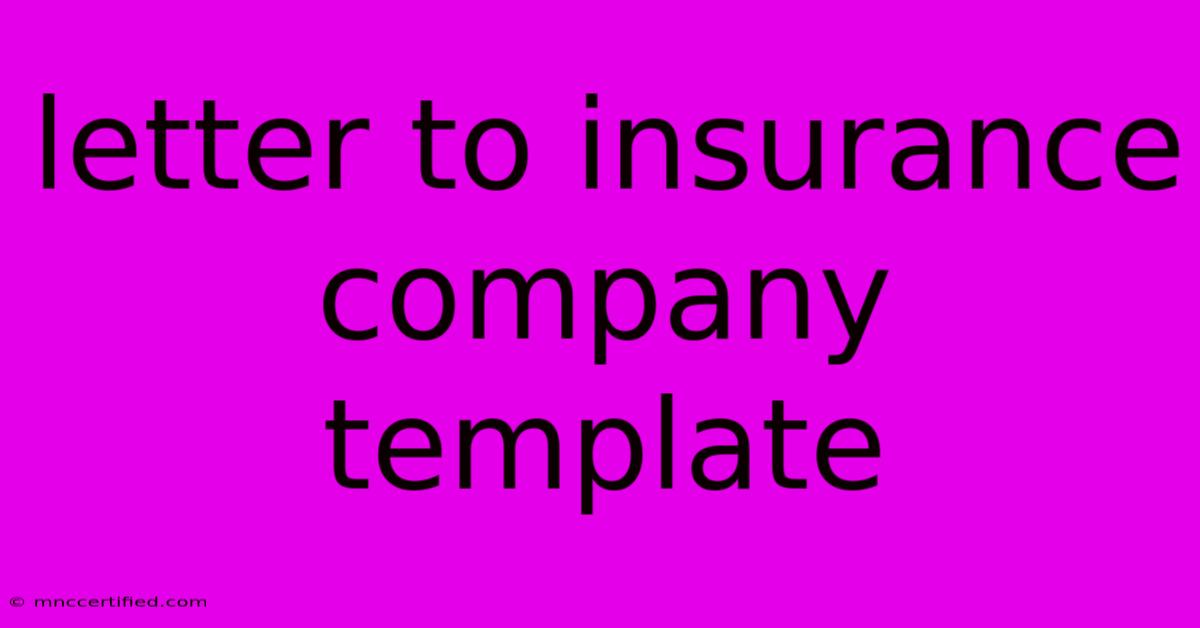Letter To Insurance Company Template

Table of Contents
Crafting the Perfect Letter to Your Insurance Company: A Template and Guide
Navigating the world of insurance can be a confusing and frustrating experience, especially when you need to file a claim. A well-written letter to your insurance company can be your best advocate, ensuring your concerns are clearly communicated and your claim is processed efficiently.
This article will provide you with a comprehensive template and guide for crafting a powerful and effective letter to your insurance company, helping you get the support you need.
Understanding the Importance of a Well-Written Letter
A formal letter to your insurance company serves several crucial purposes:
- Clear Communication: It allows you to present your case in a structured and organized manner, ensuring all relevant details are included.
- Documentation: It provides a written record of your communication, which can be valuable in case of disputes or disagreements.
- Professionalism: A well-written letter demonstrates your seriousness and professionalism, making a positive impression on the insurance company.
Essential Elements of a Letter to Your Insurance Company
While the specific content of your letter will vary depending on your situation, there are key elements that should be included:
1. Your Contact Information:
- Your Full Name
- Your Address
- Your Phone Number
- Your Email Address
2. Date
3. Insurance Company's Contact Information:
- Insurance Company Name
- Address
- Contact Person (if known)
4. Policy Information:
- Policy Number
- Type of Insurance (e.g., Health, Auto, Homeowners)
- Date of Policy
- Claim Number (if applicable)
5. Subject:
- Clearly state the purpose of your letter (e.g., "Claim for [Type of Claim], Policy Number [Policy Number]”).
6. Body Paragraphs:
- Opening: Begin with a concise explanation of your situation.
- Details: Provide a detailed and factual account of the incident or event leading to your claim. Include dates, times, and any relevant documentation.
- Request: Clearly state your request, whether it's a claim payment, policy adjustment, or other action.
- Evidence: Support your claims with evidence like photographs, repair estimates, medical records, or police reports.
7. Closing:
- Call to Action: Reiterate your request and specify a desired timeframe for resolution.
- Thank You: Express your appreciation for their attention to the matter.
8. Signature:
- Your Full Name (typed)
Template for Your Letter to Your Insurance Company
[Your Name] [Your Address] [Your Phone Number] [Your Email Address]
[Date]
[Insurance Company Name] [Insurance Company Address] [Contact Person (if known)]
Subject: [Claim for [Type of Claim], Policy Number [Policy Number]]
Dear [Insurance Company Contact Person],
This letter is to formally file a claim for [Type of Claim] under my insurance policy number [Policy Number].
On [Date], [Briefly describe the incident or event that led to the claim].
[Provide detailed information about the incident, including dates, times, witnesses, and any supporting documentation like photographs, repair estimates, medical records, or police reports].
I am requesting [State your specific request, e.g., payment for damages, coverage for medical expenses, etc.].
Please find enclosed [List any supporting documents you are including with your letter].
I would appreciate your prompt attention to this matter and a response within [Specify a reasonable timeframe for a response].
Thank you for your time and consideration.
Sincerely, [Your Name] (typed)
Tips for Writing an Effective Letter:
- Be Clear and Concise: Use simple language and avoid jargon.
- Stay Professional: Maintain a polite and respectful tone throughout.
- Proofread Carefully: Ensure your letter is free of grammatical errors and typos.
- Keep a Copy: Always retain a copy of your letter for your own records.
Additional Resources:
- Your Policy Documents: Carefully review your insurance policy for specific claim filing procedures and deadlines.
- State Insurance Department: If you are having difficulty with your insurance company, contact your state's insurance department for assistance.
Remember, communicating effectively with your insurance company is crucial for a smooth and successful claims process. Using this template and following these tips will help you craft a strong and persuasive letter that gets you the results you need.

Thank you for visiting our website wich cover about Letter To Insurance Company Template. We hope the information provided has been useful to you. Feel free to contact us if you have any questions or need further assistance. See you next time and dont miss to bookmark.
Featured Posts
-
Walk Off Win For Chiefs Broncos Fg Blocked
Nov 11, 2024
-
Veterans Day 2024 Business Hours And Observances
Nov 11, 2024
-
Chargers Vs Titans Inactives Report
Nov 11, 2024
-
Is Chiropractor Covered By Insurance
Nov 11, 2024
-
Chargers Get Boost For Titans Game On Sunday
Nov 11, 2024